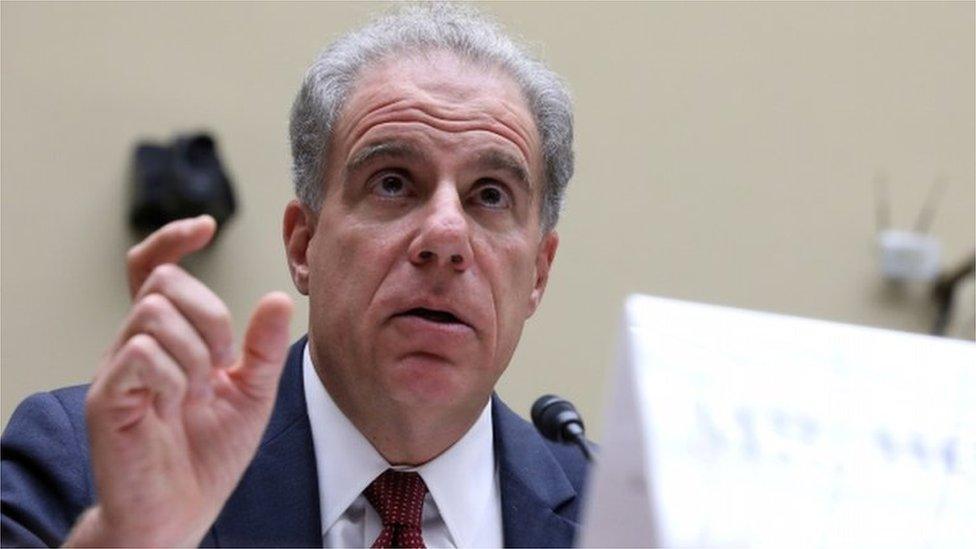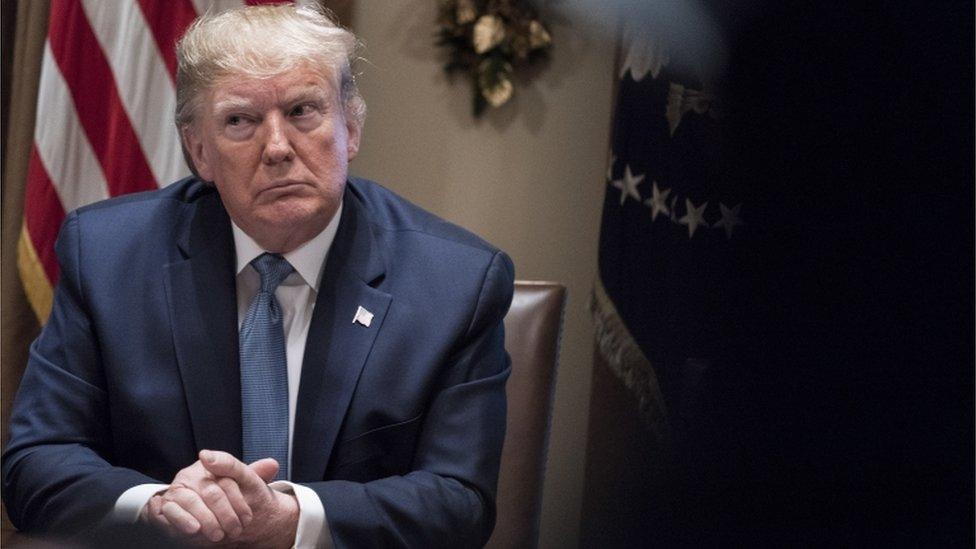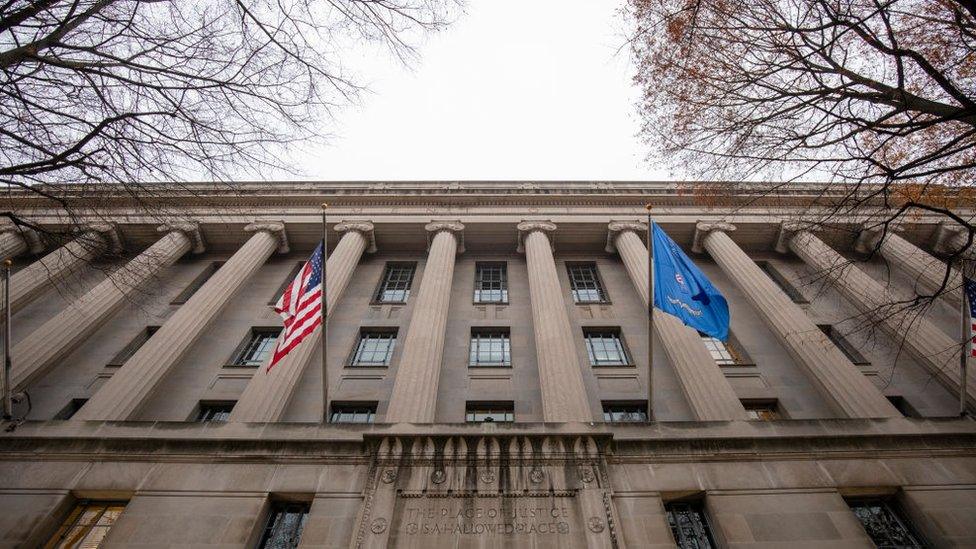'No political bias' in FBI probe of Trump campaign
- Published

Inspector General Michael Horowitz launched his inquiry last year
A US watchdog has found no evidence of political bias when the FBI launched an inquiry into the 2016 Trump campaign, despite "serious performance failures".
The US Department of Justice inspector general's report concluded the law enforcement bureau had "authorised purpose" to initiate the investigation.
But it also found applications to wiretap a Trump aide had "significant inaccuracies and omissions".
The 476-page report provides fodder for Trump critics and supporters alike.
Inspector General Michael Horowitz sought to assess the basis for the FBI's surveillance of Carter Page, a former Trump campaign adviser who had lived and worked in Russia.
How did the report criticise the FBI?
The inspector general identified 17 "significant inaccuracies or omissions" when the FBI applied to the Foreign Intelligence Surveillance Court (Fisa) for surveillance warrants to monitor Mr Page's communications.
Mr Horowitz wrote that the errors resulted in "applications that made it appear that the information supporting probable cause was stronger than was actually the case".
The watchdog also found that an FBI lawyer assigned to the Russia case doctored an email from the CIA to a colleague that was used in an application from the bureau to monitor Mr Page.
The attorney "altered an email that the other US government agency had sent" with the effect that "the email inaccurately stated that Page was 'not a source' for the other agency", the report said.
The watchdog also found FBI personnel "fell far short of the requirement in FBI policy that they ensure that all factual statements in a Fisa application are 'scrupulously accurate'".
The report said "so many basic and fundamental errors... raised significant questions regarding the FBI chain of command's management and supervision of the Fisa process".
How did the report back the FBI?
The inspector general found no basis for conservative claims that partisan hostility to Mr Trump had influenced the bureau's probe.
"We did not find documentary or testimonial evidence that political bias or improper motivation influenced the decisions to open the four individual investigations," he said.
Mr Horowitz also did not find that the FBI's mistakes were intentional.
The investigation was opened "in compliance with department and FBI policies", the report said.
Mr Horowitz also found the FBI's use of confidential informants was in compliance with agency rules.

President Trump said the report's findings were "a disgrace"
What about the 'Steele dossier'?
The watchdog faulted how the FBI presented the work of former British intelligence agent Christopher Steele, who authored the so-called Steele dossier - a series of largely unsubstantiated allegations about Mr Trump.
Mr Steele was hired to do the research through a law firm on behalf of Mr Trump's political opponents, including Hillary Clinton's campaign.

The Justice Department watchdog says there were more than a dozen procedural errors with the FBI probe, but no political bias
Mr Horowitz said the FBI "overstated the significance" of Mr Steele's past work.
The watchdog also said the FBI left out relevant information about one of Mr Steele's sources, whom Mr Steele himself had called a "boaster" prone to "embellishment".
The report noted that the CIA itself viewed the Steele dossier as little more than "an internet rumour".
But the watchdog said ex-FBI Director James Comey and his former deputy, Andrew McCabe, argued the Steele dossier should not be dismissed.
Were FBI employees biased?
While Mr Trump has often spoken of a so-called deep state plot to undermine his presidency, Monday's watchdog report also makes clear some FBI employees celebrated his victory over Hillary Clinton.
One FBI agent said in an instant message he "was so elated with the election" and likened the coverage to "watching a Super Bowl comeback".
Another agent sent a message on the morning after the election saying: "Trump!" His colleague replied: "Hahaha." "LOL," the agent responded.
Mr Trump has often cited messages previously uncovered by Mr Horowitz that were sent on work phones between two FBI employees, Peter Strzok and Lisa Page.
The messages expressed "statements of hostility toward then-candidate Trump", the watchdog notes.
But the watchdog found no evidence that Mr Strzok or Ms Page's investigative actions were influenced by their own political opinions.

Turmoil at the FBI
Analysis by Tara McKelvey, BBC News, Washington
Agents at the bureau are supposed to be apolitical, but they are now at the centre of a ferocious row. For those at the FBI, it's a nightmare.
The "G-men", as the government men were known in the 1930s, were once portrayed as good guys in Hollywood.
Overall FBI agents are more white, male and conservative than the general population in the US, and they were known in the past for their aggressive campaign against communists.
But now Trump has cast them as "Deep Staters", bureaucrats who seek to undermine his presidency because of supposed Democratic leanings.
However much the G-men might prefer to stay above the fray, they've been sucked into the biggest drama in town: the Trump Show.

What's the reaction?
Speaking at the White House on Monday, President Donald Trump said of the report's findings: "It's a disgrace what's happened."
"This was an attempted overthrow and a lot of people were in on it, and they got caught," he added.
US Attorney General William Barr rejected the inspector general's main conclusion that there was enough evidence for the FBI to launch its investigation of the Trump campaign.
America's top law official said the probe by the FBI, which he oversees, was launched "on the thinnest of suspicions that, in my view, were insufficient to justify the steps taken".
John Durham, a federal prosecutor hand-picked by the attorney general to conduct a pending, separate criminal inquiry into the roots of the Russia investigation, said he did not agree with some of Mr Horowitz's conclusions.
Democrats said the report undercuts Mr Trump's repeated claims that he was the victim of a "witch hunt".
"It was never a witch hunt," Democratic Senator Mark Warner said on Twitter. "It was the men and women of federal law enforcement doing their jobs."
What's the background?
Mr Horowitz reviewed more than one million records and conducted over 170 interviews after launching his investigation in March last year.
He scrutinised the FBI's process for launching its 2016 inquiry, known as Operation Crossfire Hurricane, to look for any collusion between the Trump campaign and the Russian government before the US presidential election.
That FBI investigation was ultimately taken over by special counsel Robert Mueller.
Mr Mueller's own 22-month inquiry concluded in April this year there was not enough evidence to conclude the Trump campaign had conspired with the Kremlin to sway the 2016 US presidential election.